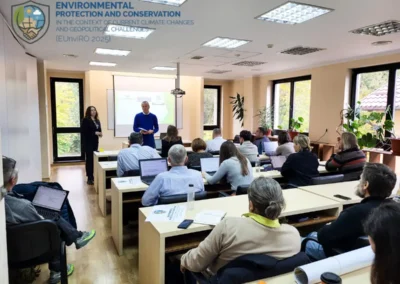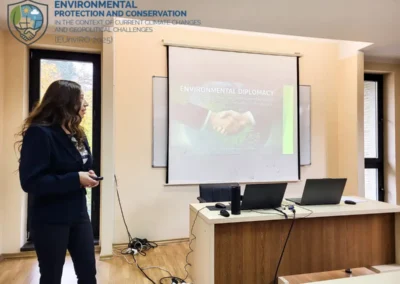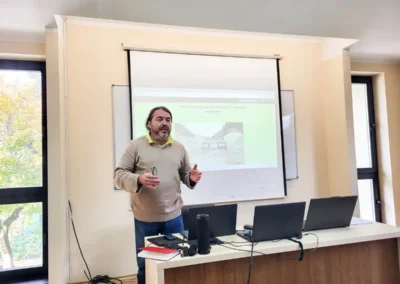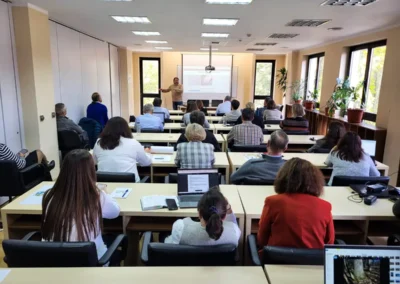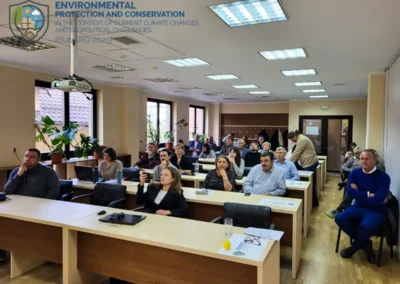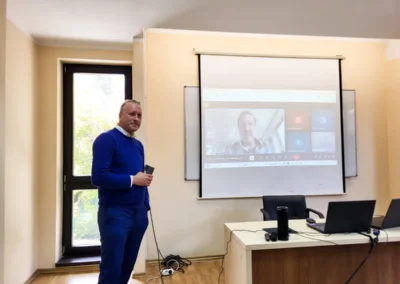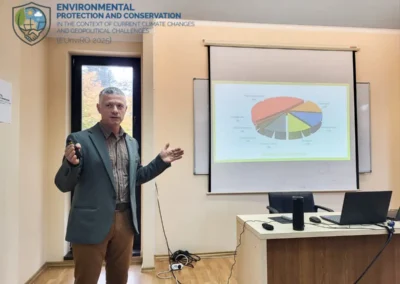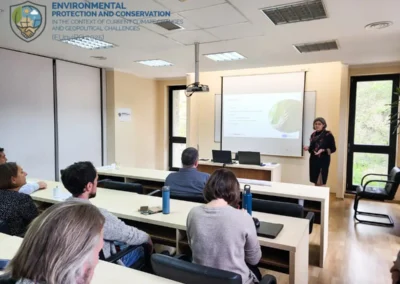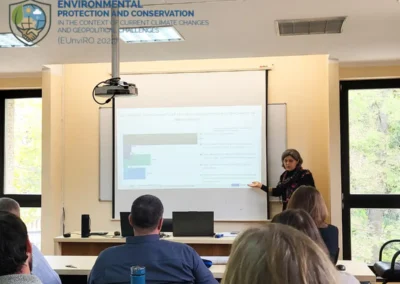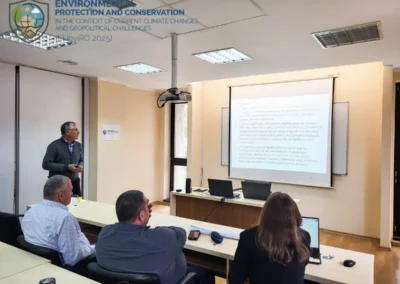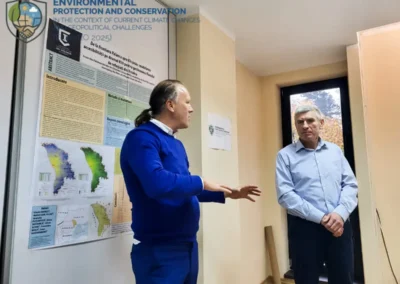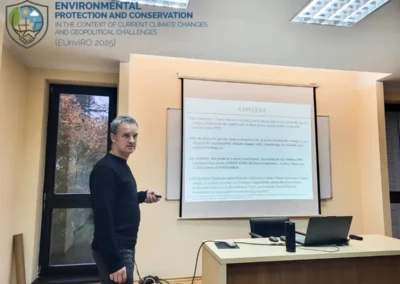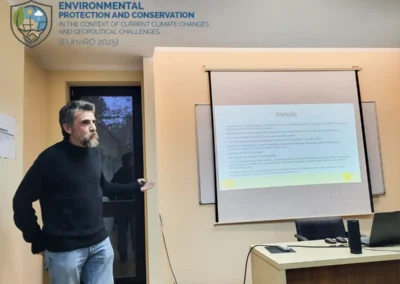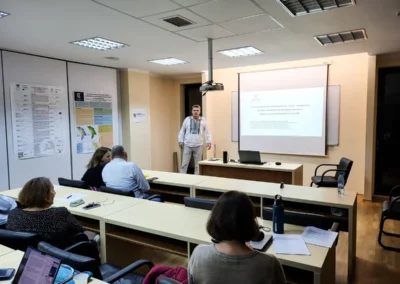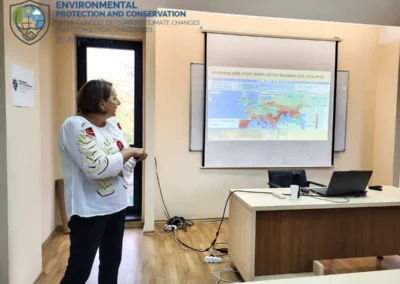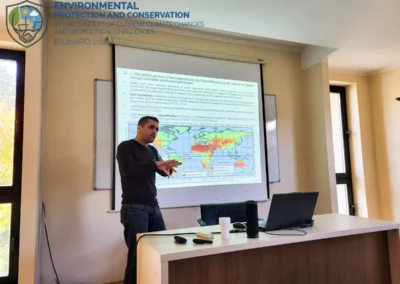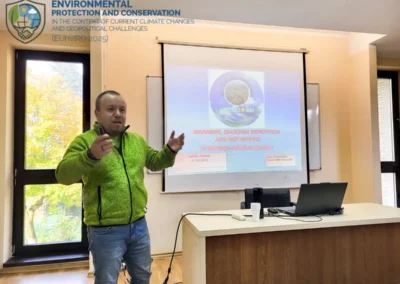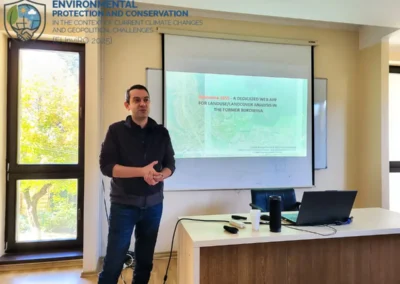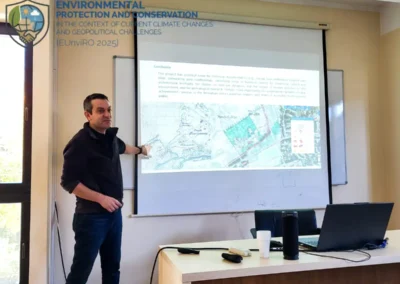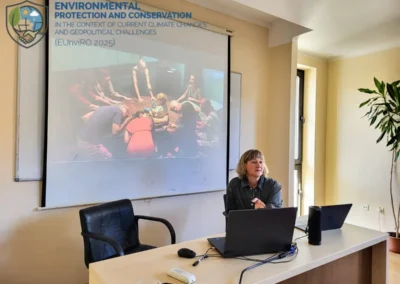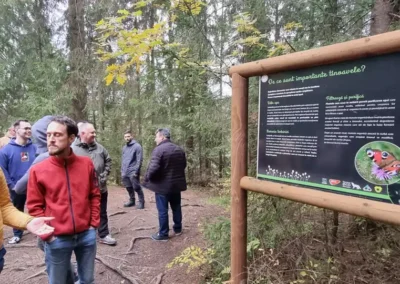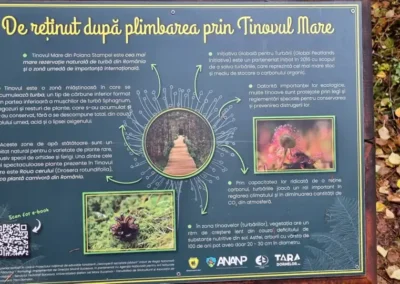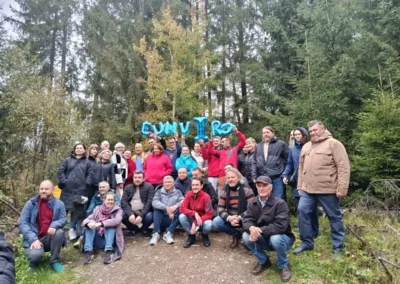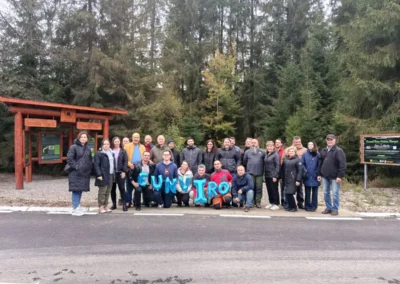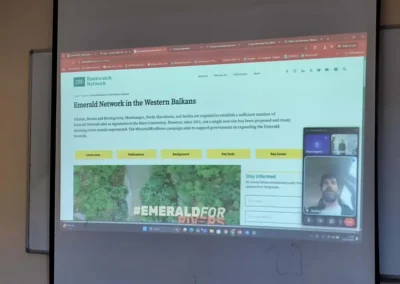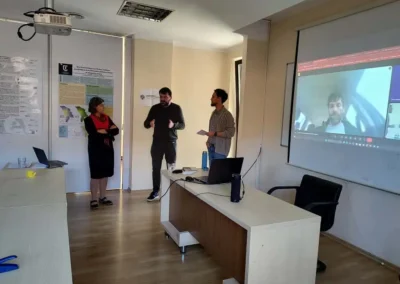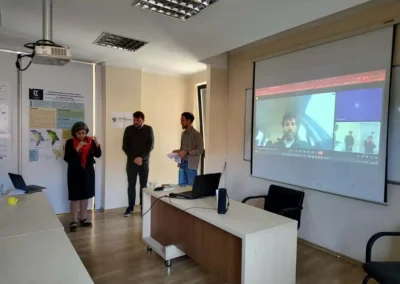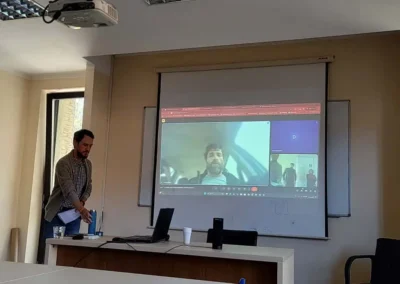
We invite you to participate in the international scientific event that will take place in Vatra Dornei, Suceava county (Romania), organized by the University of Suceava, Geoconcept Association of Applied Geography and supported by the Ministry of Research, Innovation and Digitalization of Romania, Bankwatch Romania, and SC Catalina Green SRL.
At the initiative of the University of Suceava and Geoconcept Association of Applied Geography, we are organizing the 9th conference dedicated to environmental changes and conservation (EUnviRO2025), which will take place between 9-12 October 2025 at the Training and Continued Education Center in Vatra Dornei/ Centrul de Pregatire si Formare Continua Vatra Dornei (Suceava county, Romania).
We welcome diverse scientific contributions focusing on environmental protection and conservation, past and present climate and environmental changes and their effects on abiotic and biotic landscapes / biodiversity, and environmental management in the context of increasing geopolitical challenges.
Among the main objectives of this conference are: supporting young researchers in the European space, supporting research in developing countries and outside the European Union (Ukraine, Republic of Moldova, Serbia, Macedonia, Montenegro, Albania, etc.) or from countries with limited financial resources for research and innovation (Bulgaria, Romania, Turkey), promoting exchanges of experience with internationally recognized researchers, establishing collaborations between senior researchers and young researchers (early-career researchers: ECR), and promoting scientific contributions from Central and Eastern Europe, including the publication of a Web of Science volume dedicated to this scientific event, and the production of a scientific report with importance for national and regional conservation efforts.
Topics of interest
of EUnviRO 2025 include, but are not limited to, the following scientific subjects:
Environmental conservation and protection in the context of past, present and future climate changes
Geopolitical context and environmental challenges (e.g., Assessing heavy metal contamination in agricultural soils affected by military conflict and cross-border transport between Ukraine and Romania)
Protection and conservation of biodiversity in the Carpathian region
Variability of the past climate based on proxies and multiproxies
Human impact and pollution history
Land-use/land-cover changes and climate – modeling and analysis
Climate variations and hydrometeorological risks
Impact of past, current and future climate shifts on population and economic activities
Format
Hybrid (on-site and online)
The conference will bring together leading researchers and experts in Earth Science and Life Science from Europe, as well as scientists from the international community.
We welcome both oral presentations (onsite or online) and posters.
The event will feature keynote lectures from well-respected scientists providing state-of-the-art overviews on topics of interest for this conference.
Keynote speakers
Michael BEEVERS is an Associate Professor of Environmental Studies (2011) and Chair at Department of Environmental Studies, Graduate Program on Managing Complex Disasters Contributing Faculty, Department of International Studies Dickinson College (USA). Dr. Beevers specializes in global environmental politics with an emphasis on the linkages between natural resources, security, conflict and peace. His work appears in numerous book chapters and journals including Global Governance, International Peacekeeping, African Conflict and Peacebuilding Review and The Extractive Industries and Society, among others. His book, Natural Resource Governance and Peacebuilding in the Aftermath of Armed Conflict: Sierra Leone and Liberia (Palgrave-MacMillan) was published in 2018. He has worked as a research associate at Princeton University and as a consultant for the United Nations Environment Programme and World Resources Institute. He was also a Peace Corps volunteer in Niger.
Saleem H. ALI is Chair and Distinguished Professor at the Department of Geography and Spatial Sciences at the University of Delaware (USA) and also the Lead for Critical Minerals and Inclusive Energy Transitions at the United Nations University. He has been a member of the IUCN World Commission on Protected Areas for over a decade and also served on the Science Panel for the Global Environment Facility. With field experience in over 170 countries, Prof. Ali is a National Geographic Explorer and a Fellow of the Royal Geographical Society.
Raul LEJANO is Professor Emeritus of Environmental Conservation Education at New York University, USA. Professor Lejano is a scholar in public policy, environment, and collective action, whose work on climate justice and urban sustainability involves increasing resilience in vulnerable communities to risks from extreme weather events and environmental health risks. His research suggests strategies for reforming environmental governance around an ethic of care. Current projects include studying adapting to extreme weather in developing nations –e.g., empowerment workshops at Rohingya refugee camps in Bangladesh, enacting a relational model of risk communication, and exploring high-definition virtual simulations for flood risk communication. In his (co-authored) book, The Power of Narrative in Environmental Networks (MIT Press), a theory is advanced regarding the unique capacity of narrative to capture complex human motivations and human-nonhuman relationships. The theory is further developed in his recent (co-authored) book, The Power of Narrative: Climate Skepticism and the Deconstruction of Science (Oxford Univ. Press)*. His newest books are entitled Caring, Empathy and the Commons: A Relational Theory of Collective Action (Cambridge Univ. Press) and a co-authored work entitled Relationality: The Inner Life of Public Policy (Cambridge Univ. Press).
Mihai GOȚIU is an environmental journalist and activist. He has been elected as a member of the Romanian Parliament in a former legislature and was part of several committees for environmental protection, and water and forest management of the Romanian Senate (2016-2020). Currently he is conducting research for his doctoral thesis on journalism and environmental communication in the technological era (since 2020). He has authored and published the book „Afacerea Roșia Montană”(2013, Tact Publishing House, Cluj) based on his investigative work, which has been widely acclaimed, and has earned the scholarship for excellence in journalism Milena Jesenska at the Institute for Human Sciences (2014, Vienna). M. Gotiu is the former chief editor of local publications Clujeanul, Ziarul Clujeanului and Viața Clujeanului, and of the online platform România Curată, edited by the Academic Society of Romania. He is currently coordinating România Curată, where he has developed the project Verde Curat, focusing on environmental journalism.
William KEETON is a Full Professor of Forest Ecology and Forestry at the Rubenstein School of Environment and Natural Resources at the University of Vermont, USA, where he directs the Carbon Dynamics Laboratory and is a Fellow in the Gund Institute for Environment. He also serves as Chair of the IUFRO (International Union of Forest Research Organizations) Working Group on Old-growth Forests and Reserves. His research focuses on forest disturbance dynamics, riparian ecology, forest carbon, old-growth forests, ecological silviculture, and sustainable forest management in the US Northeast and Pacific Northwest, but also travels frequently to Central and Eastern Europe where he serves on the board for Science for the Carpathians and as a Fulbright Specialist. He has ongoing research also in Chilean Patagonia and Bhutan as well. In the US, he serves on the Board of Trustees for the Vermont Land Trust and on the science advisory committee for the Forest Ecosystem Monitoring Cooperative. Dr. Keeton has authored over 100 peer-reviewed publications, including 70 journal papers. His new co-edited book“Ecology and Recovery of Eastern Old-Growth Forests”is published by Island Press (Washington, DC). He holds a BSc in Natural Resources from Cornell University (1990), a Masters in Conservation Biology and Policy from Yale University (1994), and a PhD in Forest Ecology from the University of Washington (2000).
Carl BRUCH is Director at Environmental Law Institute, Washington, DC, USA. Carl Bruch’s research focuses on making environmental law work. He has helped countries across Africa, Latin America, the Middle East, and Asia develop and implement laws, policies, and institutional frameworks to effectively manage water resources, biodiversity, forests, and other natural resources. He is an authority on the means to manage natural resources to support post-conflict peacebuilding, on environmental governance and institutions, and on ways to prevent, reduce, mitigate, and compensate for damage to the environment during armed conflict. In addition to working at ELI, Bruch has been an attorney with the United Nations Environment Program (UNEP) and the Environmental Law Alliance Worldwide (E-LAW). He is an adjunct professor with American University School of International Service, where he teaches a master’s-level course on environmental peacebuilding.
Remus PRAVALIE is an Associate Professor at the Faculty of Geography, University of Bucharest, Romania. He is currently conducting interdisciplinary teaching and research activities aimed at global environmental issues, especially climate change, land degradation and environmental pollution. He is also interested in global solutions to combat planetary environmental issues, which are linked to renewable energies or nuclear energy, as low-carbon technology. He has completed a doctorate and two post-doctoral stages at the University of Bucharest, Faculty of Geography, in the domain of Geography (Environmental Geography). He is the (first or sole) author of more than 20 scientific studies published in prestigious international journals (Q1 category), of which 10 geographical studies have a global spatial coverage. At present, he is involved in several national and international research projects, which mainly deal with the complex land degradation issue in Europe.
Laura BOURIAUD is a Professor at the Forestry Department of the University of Suceava, Romania. The expertise of Professor Bouriaud is linked mainly to environmental policies, property rights on natural resources, illegal logging, adaptation of forest management to climate change, governance, private forestry, countries in transition, economic theory of property rights, Institutional Analysis and Development framework, economics of law, advocacy coalition framework. She has been recently appointed as a honorary advisor to the Romanian Minister of the Environment.
WORKSHOP
Building Bridges: Strengthening Collaboration Between Environmental NGOs, Scientists,
and Academia for Effective Climate and Environmental Communication
Session Type: Panel Discussion
Moderator
Vlad POPESCU
Bankwatch Romania
Vlad joined Bankwatch Romania in March 2021 as a Project Manager for a new project on Energy Transition and Just Transition. He has a 10 years’ experience in the industrial sector, where he implemented various investment projects, and is also as a consultant for non refundable grants. He has a degree in Industrial Engineering and a postgraduate degree in Project Management.
He now holds the position of director of the association, combining the management of the organization with involvement in activities related to access to justice for environmental protection. He strongly believes in the importance and impact that a strong NGO sector can have in a democratic state of law and is involved in defending civil society rights against the increasing attempts of political forces to weaken them.
Abstract
In an era of increasing climate skepticism and waning public engagement with environmental issues, the need for strategic collaboration between environmental NGOs, scientific researchers, and academic institutions has never been more critical. This interactive panel discussion brings together representatives from each sector to examine current communication challenges, identify complementary strengths, and explore innovative pathways for more effective public outreach.
Background and Relevance
Despite overwhelming scientific consensus on climate change and environmental degradation, public support for environmental action faces significant headwinds. Climate skepticism persists across various demographics, while environmental topics increasingly compete with immediate socio-economic concerns for public attention. This communication gap represents a fundamental challenge that cannot be addressed by any single sector alone.
Environmental NGOs possess grassroots networks, advocacy experience, and public engagement expertise, yet often struggle with resource limitations and credibility challenges. Academic institutions and researchers generate critical scientific evidence and analytical frameworks but frequently face barriers in translating complex findings into accessible public narratives. Meanwhile, the urgent need for evidence-based environmental policies and widespread behavioral change demands unprecedented coordination between these traditionally distinct communities.
Session Objectives
This panel will address three core questions:
- What are the current barriers to effective environmental communication? The discussion will examine how climate skepticism, information overload, political polarization, and competing media narratives create obstacles for environmental messaging.
- What unique capabilities does each sector bring to environmental communication? Representatives will outline the distinct strengths, resources, and audiences that NGOs, scientific institutions, and academia can contribute to collaborative efforts.
- How can we develop more effective collaborative models? The panel will explore practical mechanisms for cross-sector collaboration, including joint research initiatives, shared communication platforms, coordinated messaging campaigns, and integrated policy advocacy.
Expected Outcomes
Participants will gain:
- Understanding of how different sectors approach environmental communication challenges
- Practical insights into developing cross-sector partnerships
- Strategies for reaching diverse audiences with environmental messages
- Framework for evaluating and improving collaborative communication efforts
Format
75-minute session including:
- 15-minute opening presentations by each panelist
- 45-minute moderated discussion exploring collaboration opportunities
- 15-minute audience Q&A and discussion
Registration and abstract submission
For registration
please send an email including the title, authors and abstract of your presentation at mindrescu@atlas.usv.ro
For any questions and details
please contact us by email at mindrescu@atlas.usv.ro
Registration dates:
Deadline registration – 1st October 2025
Abstract instructions:
Abstracts will be submitted upon registration. Deadline: 1st October 2025.
Acceptance notifications will be sent to participants after submission by email.
Abstracts will range from 1 to 4 pages (extended abstracts) for both oral and poster submissions.
Authors are advised to use the following formatting settings:
- Font: Times Roman, 12 point (text, figure and table captions, references etc.)
- Line spacing: double-spaced
- Page size: A4
- Margins: 1 inch on all sides
- Paragraph indentation: 0.5 inches (or press Tab once)
- For extended abstracts, electronic artwork and tables will be embedded in text.
All accepted abstracts will be published in a book of abstracts as a special issue of Geoconcept Journal: https://geoconcept-journal.com/index.php/geo and will also be available online.
Registration fee
The onsite conference registration fee for EUnviRO2025 covers:
- registration costs (conference materials)
- all costs for accommodation, meals, and coffee breaksfor the duration of the conference (except field trip).
Registered participants will only need to cover their transportation.
Amount:
On-site participants
- EUR 50 (RON 250) for registration (by 1 October 2025)
Online participants
- EUR 20 (RON 100) (by 1 October 2025)
Early-career researchers (ECR) can apply for financial support for participation at EUnviRO 2025.
The registration fee can be paid using one of the options provided below:
- Paypal (EUR)
- Revolut (RON)
- Bank transfer (EUR)
IBAN: RO07BTRL03404201198285XX
Bank name: BANCA TRANSILVANIA.
Bank BIC/SWIFT Code: BTRLRO22
Account holder: Marcel MINDRESCU - Bank transfer (RON)
IBAN: IBAN RO68 PIRB 3500 7469 9300 1000
Bank name: First Bank
Bank BIC/SWIFT Code: PIRBROBU
Account holder: ASOCIATIA DE GEOGRAFIE APLICATA GEOCONCEPT
On-site at arrival in Vatra Dornei (RON and EUR)
Important
Early-career researcher (ECR) grants
We offer partial or full financial support for early-career researchers (under 35) who apply to participate in EUnviRO 2025. The number of grants will range depending on the number of applicants and the quality of their submitted work.
Applicants for grants (covering registration fee and/or transportation costs) are required to specify their age and to submit the title and abstract of their presentation no later than 15 September 2025.
Official Language
The official language of the conference is English.
Translation facilities will only be provided by request or for other planned events/visits involving the local community.
Publication
As regards the publication of relevant contributions presented at EUnviRO2025, we have established a preliminary agreement with Web of Science Journal (WoS) to publish a volume dedicated to this conference.
Based on our experience from previous conferences and workshops, we expect that, provided a sufficient number of high-quality contributions are submitted for the conference, we will be able to publish a special volume with a Web of Science Journal. We have had a successful collaboration with Quaternary International in the past which enabled us to publish three volumes comprising contributions to our scientific events.
Details of article submission, editorial requirements and scientific ethics guidelines will be sent to participants once we have obtained an agreement with a WoS journal, which according to industry practice, can only be determined after the conference is over, and depending on the scientific titles submitted to the conference. The guest editors of the volume will be selected from the conference scientific committee. So far we have contacted several WoS (Clarivate) journals that are interested in publishing the important contributions of our scientific event.
All abstracts (book of abstracts) and part of the papers will be published in the Romanian journal Geoconcept Journal, internationally indexed (BDI): http://geoconcept-journal.com/index.php/geo
Special requests
Participants who have specific dietary restrictions or requirements are kindly asked to communicate this upon registration.
We would like to inform you that we provide accommodation in twin rooms. Participants who prefer to occupy a single room will pay a supplementary accommodation fee. However, we do not encourage this due to the limited number of rooms available at the venue.
If supplementary rooms are necessary, we will make arrangements with hotels located in the vicinity. However, these costs are not included in the registration fee and will be paid separately.
How to get there
Distance Education and Long-Life learning Office Vatra Dornei, University of Suceava
Centrul de Pregatire si Formare Continua Vatra Dornei, Universitatea Suceava
Address:
Strada Parcului 2, Vatra Dornei 725700, Suceava county, Romania.
Coordinate: 47.3418816, 25.3574445
WEB
Preliminary program
| 9 October 2025 | Arrival and check-in. Registration. |
| 10 – 11 October 2025 | Presentations and field activity |
| 12 October 2025 | Check-out and departure |
Further information
concerning the detailed program of the conference, the field trip costs and other details of interest will be included in the Second Circular or provided on request by email as soon as they are available.
Detailed information regarding the accommodation arrangements per rooms will be provided by email.
Conference Organizing Committee
Chairman
Marcel MINDRESCU
Department of Geography, University of Suceava, Romania, and Geoconcept Association of Applied Geography
+40 742 051 475
mindrescu@atlas.usv.ro
Vice Chairmen
Laura BOURIAUD
Forestry Department, University of Suceava, Romania.
laura.bouriaud@usm.ro
Vlad POPESCU
Bankwatch Romania, vlad.popescu@bankwatch.org
Secretary
Ionela GRADINARU
Geoconcept Association of Applied Geography, Romania
ionela.gradinaru@gmail.com
Diana ISTRATE, Department of Geography, “Ștefan cel Mare” University of Suceava,
rotidia@yahoo.com
IT Manager
Valentin DIMA, president Validsoftware
https://validsoftware.ro/
Audio-Video Manager
Codrin SAVIN, doctorand, Department of Geography, “Ștefan cel Mare” University of Suceava, Romania, cod.f.savin@gmail.com
Scientific Committee
Dr. Michael D. BEEVERS, Department of International Studies Dickinson College, USA, beeversm@dickinson.edu
Dr. Saleem ALI, Geography and Spatial Sciences, University of Delaware, USA, saleem@udel.edu
Dr. Raul LEJANO, New York University, USA, lejano@nyu.edu
Dr. Carl BRUCH, International Programs Environmental Law Institute, USA, bruch@eli.org
Dr. Todd WALTERS, Middlebury Institute of International Studies at Monterey, USA, toddwalters33@gmail.com
Dr. Juliana NOGUEIRA, Faculty of Forestry and Wood Sciences, Czech University of Life Sciences Prague, Prague, Czech Republic, snogueira.j@gmail.com
Dr. Heitor EVANGELISTA, Department of Biophysics and Biometrics at the Rio de Janeiro State University, Brazil, evangelista.uerj@gmail.com
Dr. Angelica FEURDEAN, Goethe University, Germany, angelica.feurdean@gmail.com
Dr. William KEETON, Rubenstein School for Environment and Natural Resources, University of Vermont, USA, William.Keeton@uvm.edu
Dr. Remus PRAVALIE, University of Bucharest, Romania, pravalie_remus@yahoo.com
Dr. Gabriela FLORESCU, Department of Geography, “Ștefan cel Mare” University of Suceava, Romania, gabriella.florescu@yahoo.com
Dr. Laura BOURIAUD, Forestry Department, University of Suceava, Romania, bouriaud@gmail.com
Dr. Marcel MINDRESCU, Department of Geography, University of Suceava, Romania, Department of Geography, mindrescu@atlas.usv.ro
Supported by:
This conference is funded by the Applied Sciences Doctoral School at the University of Suceava, Geoconcept Association of Applied Geography, Ministry of Research, Innovation and Digitalization of Romania, Bankwatch Romania and SC Catalina Green SRL.
The activities are funded by the PROTEUS project (Protecting EU Values and Fundamental Rights through Public Participation and Civil Society Assistance in Central Europe) of the Transatlantic Foundation, co-financed by the European Union.
Co-funded by the European Union. Views and opinions expressed are, however, those of the author(s) only and do not necessarily reflect those of the European Union or the European Education and Culture Executive Agency. Neither the European Union nor the granting authority can be held responsible for them.


